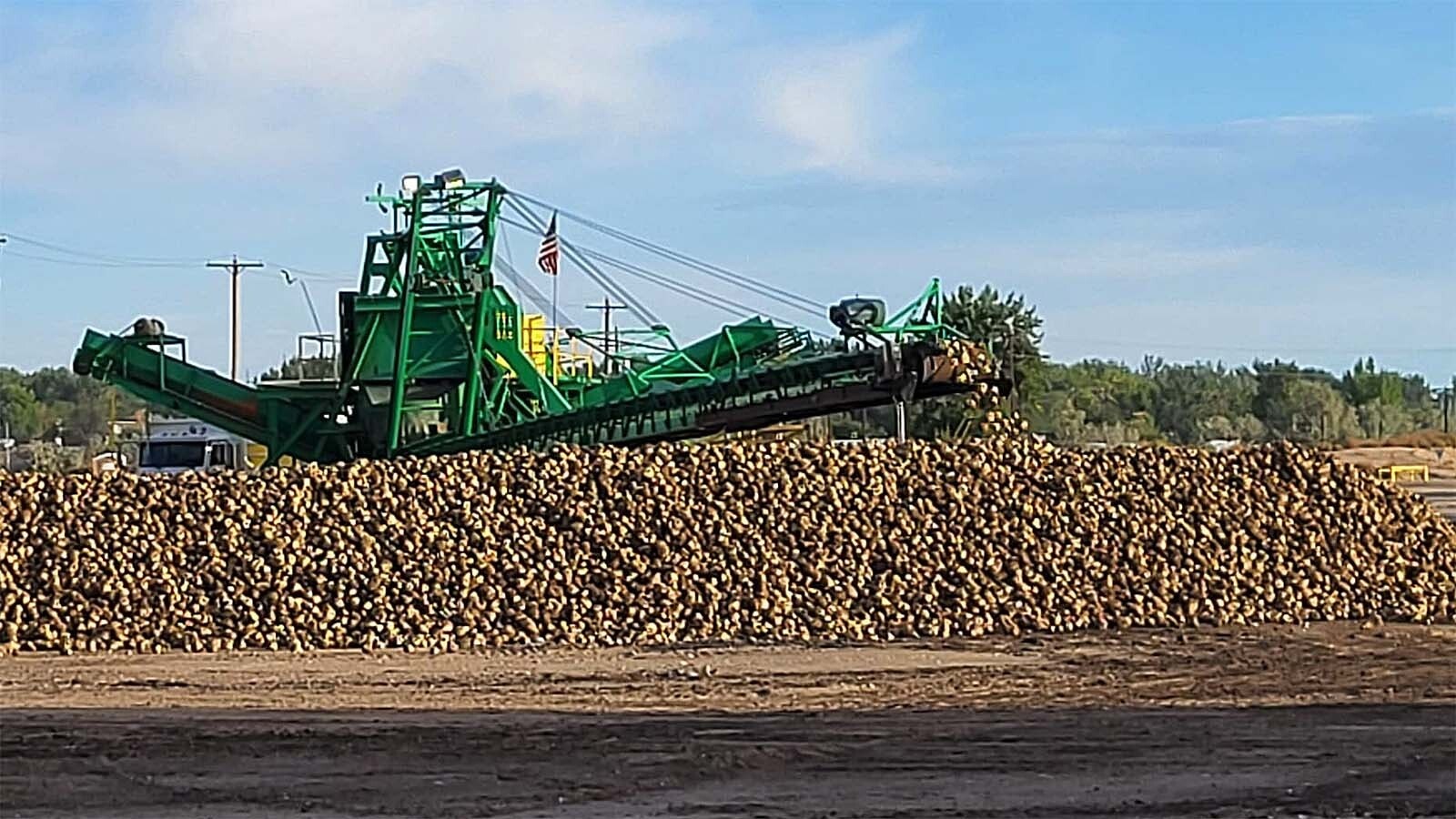Americans are eating less sugar, thanks in part to weight loss drugs like Wegovy and Ozempic. But Wyoming growers say that’s not the real reason that prices in the sugar beet market have plunged 33% year over year.
Doctors advise GLP-1 users to avoid sugary drinks, candy, and baked goods because they can cause blood sugar to spike, interfering with the function of the drug. Sweets can also contribute to negative side effects like nausea.
“The statistics now are that somewhere around 9% of the population are using these drugs to help with weight loss and other health-related issues,” Wyoming Sugar Company CEO Mike Greear told Cowboy State Daily. “They trend more toward higher protein items and so, with that, you see baked goods and candy, stuff like that, a decrease in consumption.”
And people are taking that advice, which has been good for their health but not so hot for America's sugar beet farmers who produce more than half of the nation's domestic sugar.
As people consume less sugar, sugar beet prices are down by a third while stockpiles of the sweet stuff balloon, according to Reuters, which reported this past week that farmers nationwide planted the fewest acres since 1982.
Adding to the anti-sugar movement is Health and Human Services Secretary Robert F. Kennedy Jr., who has called sugar and products made with it "poison" while targeting the commodity in his Make America Healthy Again Commission's first report, Reuters reports.
Wegovy and Ozempic consumers are buying 6% less candy and chocolate and 10% fewer bakery sweets, according to industry analysts OC&C Strategy Consultants.
The impact from the weight-loss drugs is a minor influence on sugar prices, Greear said. The real issue is what he calls sugar dumping, where countries subsidize the product, then take it to market at cut-rate, below-market prices.
“Subsidized imports flooded the market before President Trump got into office,” Greear said. “So, you have countries like Brazil, in particular, who have subsidized their sugar industry, and India as well … and they dump subsidized sugar on the world market.”
The U.S. sugar program was supposed to help protect American farmers from sugar dumping, but Greear said it wasn’t properly managed during the Biden administration. America’s sugar beet growers are paying the price.
“So, we have an oversupply of sugar, which is probably going to take another year to clear out,” he said.
Only Seven Left
Falling sugar prices and rising inflation has led sugar plants across the United States to close. The most recent victims include Sidney Sugars, located in Sidney, Montana, and Spreckels Sugar Factory in Brawley California.
Sidney Sugars closed two years ago, while Spreckels announced that this year will be its last.
That leaves Wyoming Sugar among seven remaining sugar beet processors left in the United States.
The cooperative is small, with 57 farming members.
“We’re a small company,” Greear said. “But we are vital to this area. And we’re a big company for Wyoming in a lot of respects, but a small company in the big scheme of things.”
Great Harvest Meet Terrible Market
The pain of low prices doesn’t just hurt sugar beet factories, though, it’s also hurting the growers, too.
Worland sugar beet grower John Snyder is having one of his best harvests with above average yield and near-record sugar content.
In a normal year, that would mean his mortgage lifter crop is doing bangup work for him in the marketplace. But this is not a normal year. With prices down 33%, he’s looking at another barely break-even year.
“The good news is the sunshine is out today and we’re hopefully drying out, and our crop is good,” he said, determined to focus on the bright side. “The Lord blessed us with a great crop, and he always provides us a way to get it out.”
But the bad news is that Snyder can’t really afford to keep breaking even year after year.
“I mean, you’re going to have to survive a year on what we’re getting right now,” he said. "But we can’t survive on that for a long period of time.”
Snyder has equipment purchases he will need to make soon. Like a new beet digger to replace his old one. When he looked, the prices for those are soaring — 80% higher than they were when he bought his old one.
That’s not the only double-digit price Snyder faces out there in the farm world.
“I asked my fertilizer dealer the other day, ‘So, tell me what fertilizer prices have done the last five years,’” Snyder said.
The price he was told was 80% higher than when he bought his beet digger about 10 years ago.
“And nitrogen has gone up 68% in the last five years," he added. "Phosphate has gone up 67%. It’s almost $1,000 a ton right now. Potassium is up 40%, and ammonium sulfate, which is another source of nitrogen but has sulfur in it, has gone up 65%.”
Labor prices are up too, and fuel prices, while “not bad right now,” aren’t exactly down either.
“I’ve had some of my guys around for 20 years,” Snyder said. “And they’re good guys, so I try to take care of them and keep it fair for them, too.”
That’s getting harder to do with current market dynamics.
“Midwest beet prices have dropped 42% in the last two years,” Snyder said.

Sugar As Poison
Make America Healthy Again could stir new headwinds for the sugar beet industry, Greear acknowledged, with U.S. Human Health and Services Secretary Robert F. Kennedy labeling sugar as outright poison in April.
“There’s things that we’ll never be able to eliminate like sugar,” Kennedy told reporters then. “And sugar is poison, and Americans need to know that it is poisoning us.”
That word “poison” is particularly concerning to Greear and the growers he represents.
“Why would you call something that’s natural poison?” Greear asked. “All the sugar substitutes which are made in a laboratory, I might agree those might be poison. We don’t know all the side effects of those. But there’s sucrose in your apple that you eat. Sucrose in the orange that you eat. Sucrose in a banana. It’s all natural.”
The statement bothered Snyder, too, who also thinks artificial sweeteners are more problematic.
“I’ve seen lots of articles about the health risks of artificial sweeteners and everything,” he said. “So, I’ve been surprised in (Kennedy’s) comments that he’s going after a natural sweetener like sugar and hasn’t said much about artificial sweeteners.”
Chris Fornstrom, a sugar beet grower near Pine Bluffs, also wondered about that.
“I think as much as RFK hates sugar, he really hates processed foods and unnatural foods even more,” he said. “So I think that the artificial sweeteners might be just as big of an enemy as sugar from a sugar beet or from sugar cane.”
Fornstrom, like Snyder, believes he’s looking at an excellent harvest this year. Weeds have slowed down his harvest a little, but his yields so far are looking very good, and he believes the sugar content will be average or better, once his harvest really gets going.
The down market does tighten things up, he acknowledged, but he, too, was looking on the bright side of things, for now.
“If you look at the broader commodity markets, you’re still in a good spot, growing sugar beets in southeast Wyoming,” he said. “We raise corn, wheat and pinto beans as well, and all those markets are down significantly more than 30% over the past two years. So compared to the broader market, it’s getting its butt kicked slightly less than the others.”

Market Has Room For Less Consumption
Americans have been told to watch their sugar intake for decades now, Greear said, and rightly so he believes.
Those kinds of messages don’t bother him at all.
“People getting healthier and eating sugar in moderation and exercising, I’m all for that,” he said. “People who are overweight and are able to get healthier, I’m all for that.”
The Dietary Guidelines for Americans issued by USDA and the Health and Human Services Department for 2020 to 2025, recommended limiting added sugars to less than 10% of calories per day for people ages 2 and older.
“We agree to the 10% recommendation that’s been proposed for your diet,” Greear said. “There’s nothing wrong with that. Everything in moderation right?”
The marketplace actually has plenty of room for Americans to cut back on sugar consumption, Greear said. American producers are only supplying about 80% of the overall demand, leaving plenty of room for cuts to consumption and even increased American production — but only if sugar dumping is properly addressed.
Sugar, Greear added, has a lot of functions in the food industry. It helps create texture, and it works as a preservative.
“It’s a good, very diversified ingredient,” he said. “Again, a balanced lifestyle on that. Don’t eat too much of any one thing, sugar included, and exercise. (That) will be healthy.”
Renée Jean can be reached at renee@cowboystatedaily.com.





